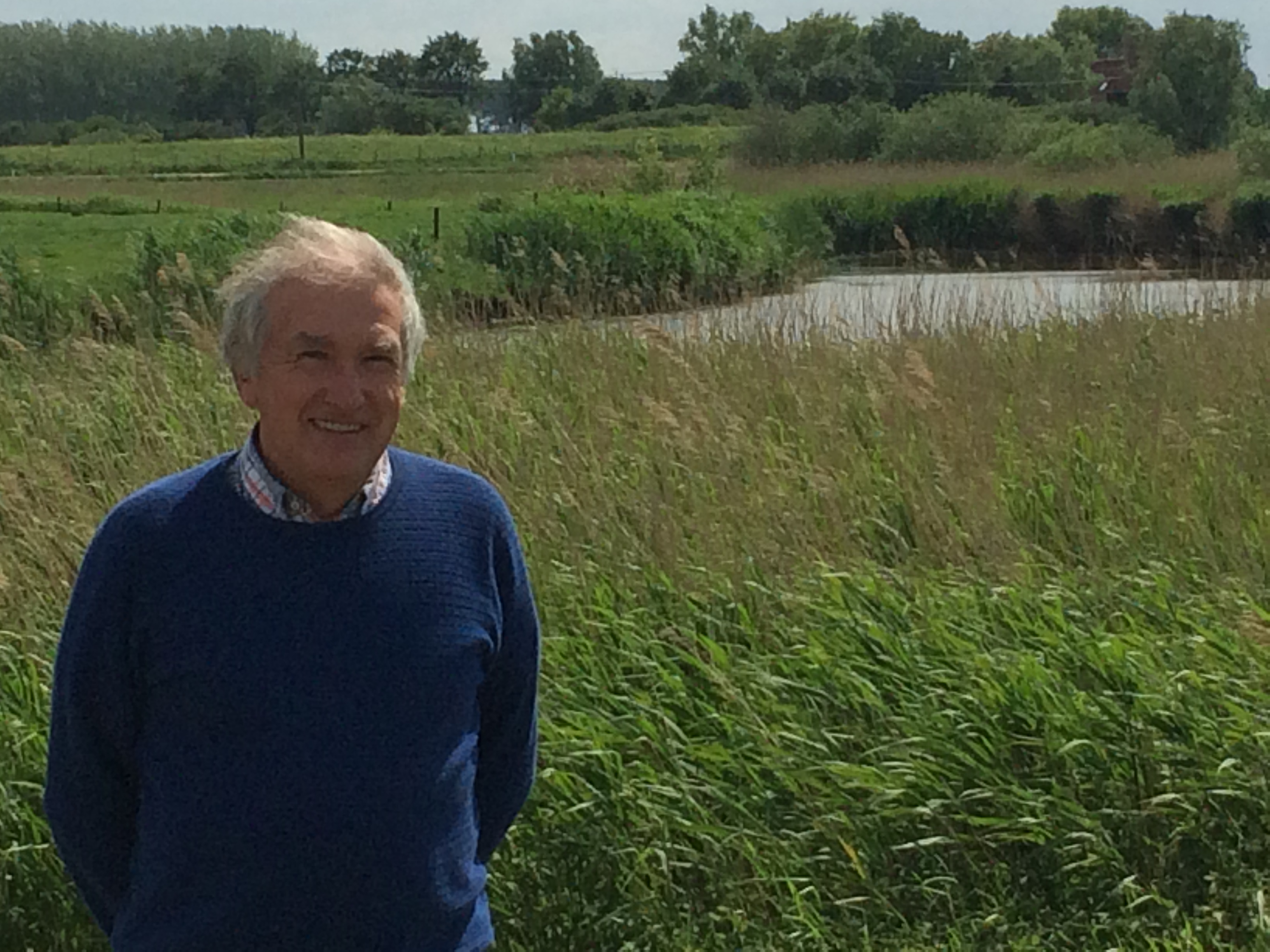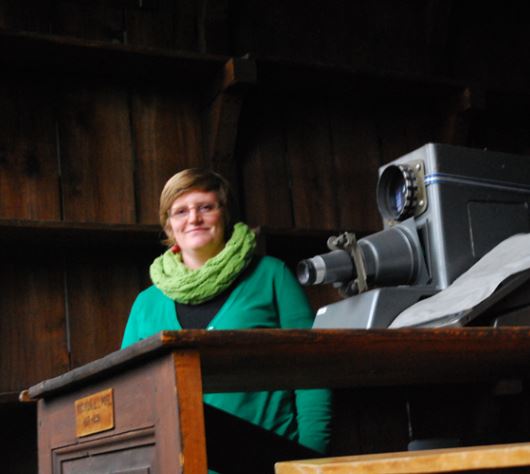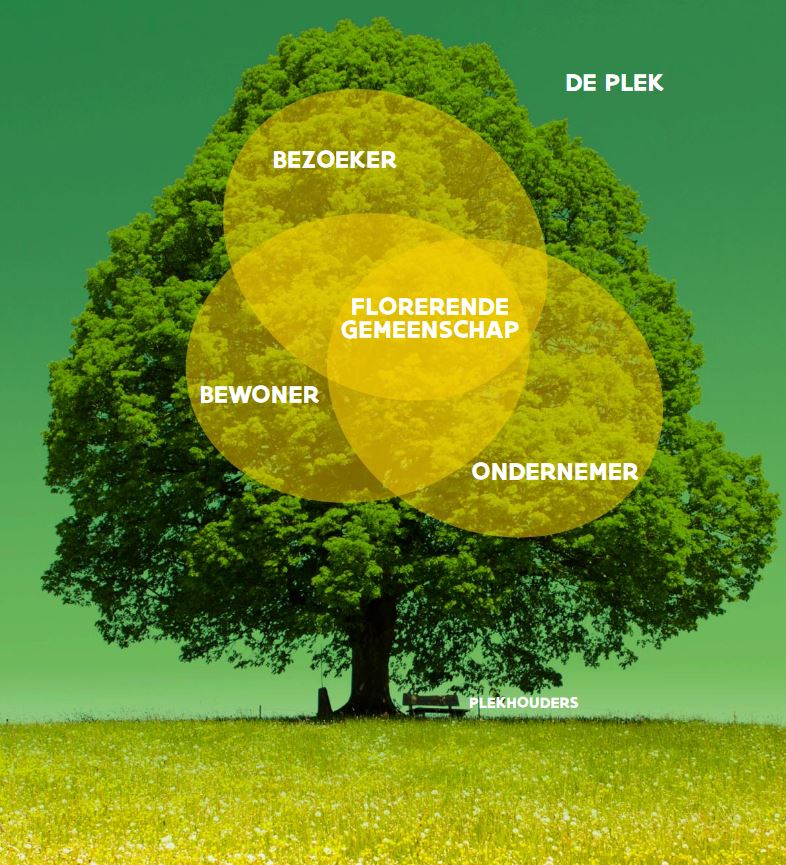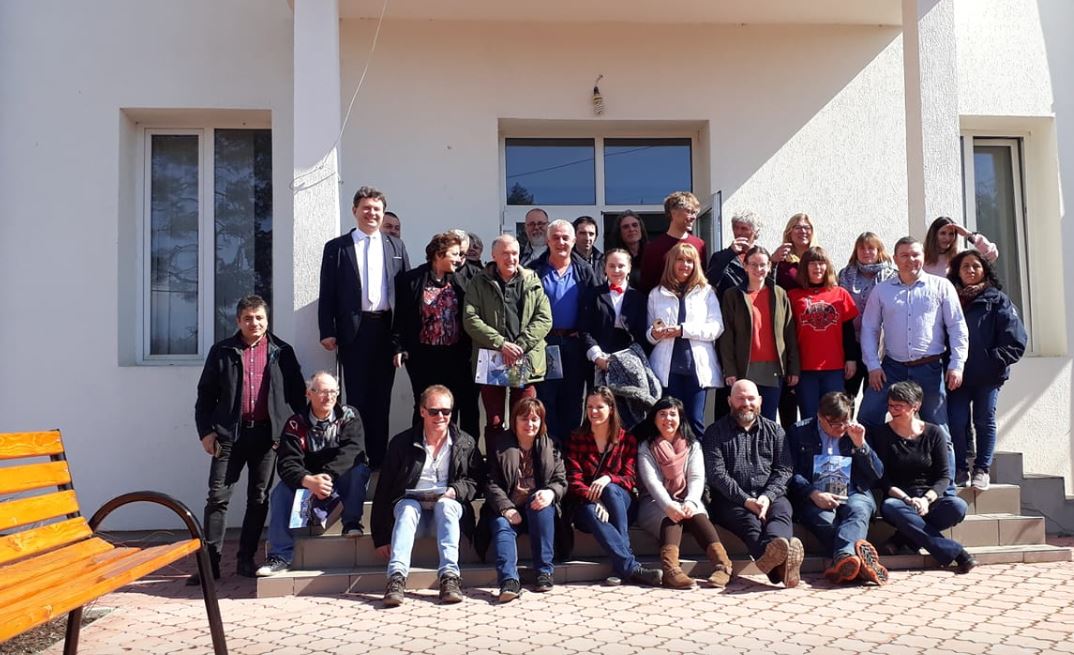On a walk with Willy van Zandweghe
“Don’t let the silence wait”
Interview and translation by Bart Van Damme and Deepl

We want to make the municipality of Sint-Laureins a thriving destination. If one man in Sint-Laureins is allowed to put this search on the hat as a compliment, then it is Willy Van Zandweghe anyway. Even though he would never do it himself. The chairman of the tourist advisory board in Sint-Laureins is a patient person who connects and unites. We stroll along some lonely farm roads on the Sint-Margrietestraat, close to his home, looking for new opportunities for the walking network. In the meantime, we have a heartfelt conversation about the shared dream that we cherish for this part of Meetjesland.
We’re near a creek (De Val) where probably never a living soul comes, except for the farmer and a stray neighbour. It’s very quiet here. We see a tractor driving in the distance but don’t hear it. “People need silence”, Willy explains. “Rest in your head and a coach who teaches us to appreciate these things again.” Willy has just retired and is determined to open a Bed & Breakfast himself. The tourism microbe has got a good grip on him. “I see a lot of possibilities around the experience of silence. Yoga for example, in this beautiful and unknown place. Horse therapy. Mental coaching. These are all ideas that live with fellow logistics managers in the immediate vicinity. It has become clear to me that there is a need for people. It has also become clear to me that there is a need for people to work on themselves in their free time, to step out of the system for a while. And there is a need for individuals but also for groups to create opportunities around this. A search on the internet taught me that there is already such a tourist offer. But we have the right environment, that vastness, that desolation, that beautiful nature…” A challenge, according to Willy. “Can such a project be described as ‘flourishing’,” he asks himself out loud. “I certainly see added value for the entrepreneur and for the tourist. But is it also a win for the inhabitants? The environment? A project that works on the experience of silence, it is in any case up to itself to keep the silence and to bring it about where necessary.” We discuss the fact that such places of silence should be quite exclusive, which makes them even more valuable and therefore needs to be protected even better. “Also an added value for the people living in the neighbourhood, right?” concludes Willy. The connection with the tourist entrepreneurs has been made and the ideas of what this experience of silence can contain are already quite clear. The next step in the project is to make a brochure or an online place to effectively promote this. And one exclusive experience should lead to the next need of people who also want to get into the story.
On 10 June, a new ‘Bike & Discover’ event will be launched. This project has been running for several years now and arose out of the complaint that the tourist board was more likely to set up projects with the restaurants and cafés and less so with the accommodation sector. “Instead of going on the defensive, we quickly came up with this concept,” explains Willy. “This will be the third time and last year we had 70 cyclists. The accommodation sector is very enthusiastic that we are putting their company in the spotlight in this way. We get to know our own inhabitants of the tourism sector, including people from all over the region, but through word-of-mouth advertising and facebook sharing, interested parties from all over Flanders come to this day to get to know our accommodation companies better. And when asked whether this is ‘flourishing’, we come to one conclusion by switching from one look to another. “Of course we do.”
Without a vision, without a dream, the Sint-Laureins Tourist Advisory Board would never have become a model for the entire region. Lievegem, Maldegem and Assenede also have the idea of setting up such an advisory council. “We have come to the point where I have to refuse enthusiastic people on our board of leading volunteers, because there would then be too many of us,” explains Willy. “This is very unfortunate and even a bit difficult to stop that enthusiasm. I have now come to the conclusion that working in smaller thematic groups is a very good way of channelling all that enthusiasm. Fot example: we have the idea to expand our traditional ‘winter walks’ more because of success, a thematic group could take care of this and take responsibility. This will give us a stronger organisation. And we keep a lot of commitment aboard.” The chairman of the advisory board also has dreams, in addition to the expansion of his own B&B soon. “I am still convinced that we can enhance the walking experience within our walking network. There are still large loops on paved roads which, thanks to a few crossings in the polders, can become spectacularly more beautiful. A crossing over ‘De Val’, here near my house, is one of those projects that I still dream of. And when it comes to cycling, I see a safe axis with a separate bike path between Sint-Laureins and Watervliet and connections in the direction of the small border villages Sint-Margriete and Waterland-Oudeman. I hope that the municipality will work together with us to achieve this.” Willy’s dreams have the advantage of clarity. “A lot has already happened,” admits Willy, “but we can raise the bar even higher, so that our cycling and walking paradise at the border becomes even more attractive here and seamlessly merges into Zeeuws-Vlaanderen (Holland).
Tourism Officer Sofie Van Waes testifies
“Why don’t we learn this at school?”
Interview and translation by Bart Van Damme and Deepl

Sofie Van Waes recently became the tourism officer in the municipality of Assenede as ‘cultural policy coordinator’. Following on from her colleague Lien Ysebaert, she was ‘thrown’ a month ago in the Flourishing Destinations project. She immediately ended up in a coaching programme ‘coach the coach’ by Els Meerschaert, who guides us in making optimal use of Appreciative Inquiry, a method to make projects flourish better. Appreciative Inquiry is an approach in which all interested parties are involved and in this way change can be determined for itself. This is done by asking many and especially the right questions.
“Appreciative Inquiry, why don’t we learn this at school? It may take some time to master, but once you get away with it, you can achieve so much with it! Els is great, how she gets the group excited is incredible. You just get a lot of ‘desire’ to get on with it,” says Sofie.
According to Sofie, the municipality of Assenede offers many opportunities to make it a thriving or ‘flourishing’ destination. “In my opinion, the challenge is to get everyone enthusiastic about the idea of ‘Travelling to tomorrow’. From the point of view of tourism in Assenede, it is our task to look openly and to involve our (local) community. In this way we make sure that our lime tree starts to live.” With the lime tree, Sofie refers to the model drawn up by Tourism Flanders, in which the flourishing community is seen as the point of contact where tourists, entrepreneurs and residents benefit from tourism in the region. In which they, as placeholders, make that beautiful place even better, as a place where you dream of really wanting to live.

Meetjesland Living Lab: the place and the placeholders
Together with Mechelen and De Kempen, Meetjesland is in Flanders a testing ground for new insights into tourism. Together with the British tourism expert Anna Pollock, Tourism Flanders is investigating new insights into tourism growth by ‘Travelling to Tomorrow’ (Reizen naar Morgen). The unbridled growth of the tourism sector has a destructive downside and will lead to a crisis. Nevertheless, the value of tourism for a region such as Flanders can be great, indeed even change the country. If and only if… it is for the benefit of the traveller, the entrepreneur, the place and the inhabitant.
The visitor undergoes a ‘transforming experience’, in other words, mentally takes home things that are remembered for a lifetime. In addition, the visitors help to improve the destination during their stay and make sure that they (or their loved ones) return there themselves.
The entrepreneur is experiencing steady growth and sees his company flourish and be appreciated by neighbours and visitors.
The resident experiences the visitors and the flourishing tourism sector as an added value for his or her own region, can tell his or her own story and history and sees his or her own living environment flourish by improving the tourist infrastructure.
The place is thriving. Flourishing. And it is a place where people like to stay, permanently or temporarily. A living organism that blossoms like a flower in spring and falls asleep during the winter to continue flowering. The owners keep this place as a beautiful lime tree where all couples in love meet up in the middle of summer, a magical place where it’s good to be.
In a joint reflection and exchange Meetjesland with the Scottish region Angus and the Romanian region Bazinul Dornelor will train themselves in asking the right questions to the placeholders. How do they want to move their region forward?
In concrete terms, this is already leading to a whole series of project ideas in the creek municipalities of Sint-Laureins and Assende, but also to a way of working at the provincial regional centre Huysmanhoeve in Eeklo, where the Rural Centre manages and implements the operation, supported by a solid team of volunteers. In the next phase of the project, the initiators of this series of projects will carry out the first results on the ground. The magic words here are: a listening attitude’ and ‘working together (with space)’.
The projects concern efforts for more liveable villages, the idea of developing an art route, a route of landscape views in the creek area, ambassadorship, tasting and picking gardens, organised covered wagon trips, cooperation between event organisers, etc. The projects also involve the development of an art route.
Exchange in Romania
“We cherish the ambition to be flourishing”
Tourism Meetjesland with Rural Centre Meetjesland and a series of tourism initiators from the municipalities of Assenede and Sint-Laureins went on an exchange to Bazinul Dornelor in Romania, near the city of Panaci (April 2019). Our partners from the Scottish region of Angus were also there.
Faith in a flourishing destination
The premise for the Flemish, Scottish and Romanian partners to think about the future together is quite simple: as tourist destinations, we cherish the conviction that tourism can make a region flourish (prosperity), not only for the entrepreneurs but also for the inhabitants. This calls for a different approach and we are testing this very approach together, among other things through the exchange of experience. Moreover, we think that our visitors will also benefit if they end up in a destination where they (entrepreneurs, residents and tourists) take care of the place together. This is the shared dream that we, as a tourist destination, have been thinking about for five days.
Learning from each other
An instructive exchange within the framework of the Flourishing Destinations project in which company visits and study moments show that tourist regions from three totally different countries have a lot in common and can learn an incredible amount from each other.
Positive approach
During this exchange, the emphasis was on appreciative inquiry (ask people the right questions and you create enthusiasm and ownership) and the positive results that sector cooperation can lead to.

